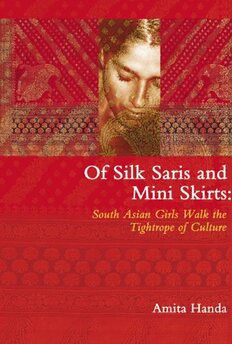
Of Silk Saris & Mini-Skirts South Asian PDF
222 Pages·2003·1 MB·English
Most books are stored in the elastic cloud where traffic is expensive. For this reason, we have a limit on daily download.
Preview Of Silk Saris & Mini-Skirts South Asian
Description:
Dr. Handa uses her own narrative and that of South Asian teenage girls to explore the ways identity is imagined and constructed by second generation immigrant youth in Toronto. Using feedback from interviews, the author examines how South Asian women are constructed and represented through discourses of race, nation, culture, and community. Handa suggests that young South Asian women find themselves caught between fragmented aspects of the self. She draws on a poignant memory from her own experience to describe such states of being: I do not remember when the marvel of being part of something larger began to fade. I don't remember when it began, me getting smaller than my body, the darkness of my steps, the shallowness of my voice or the fear. This is where I am caught--not between two cultures, but between omissions, between fragments of myself. Dr. Handa discusses the community's struggle with the threat of the erosion of their "authentic" cultural practice. Her critical theoretical perspective illuminates how young women move within the boundaries of cultural preservation at the same time that they embrace aspects of the communities in which they live. She examines conflicts with parents, fashion, "bhangra" music and dance in her discussion of Canadian, South Asian, and diasporic fusion. Handa explores whether these young women both desire inclusion in and are excluded from Canadian cultural begemony. She also examines the theoretical implications of exclusion and, conversely, the problematic of "cultural preservation."
See more
The list of books you might like
Most books are stored in the elastic cloud where traffic is expensive. For this reason, we have a limit on daily download.
